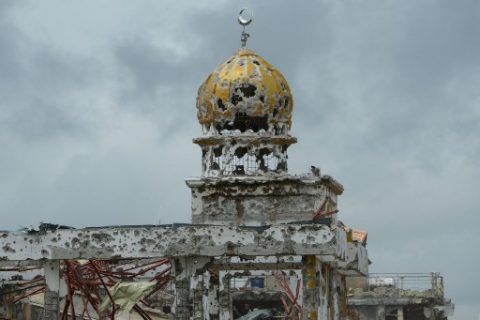
By Caesar Vallejos, EBC Correspondent
The European Union (EU), the Philippine’s largest source of foreign direct investments, is earmarking 55 million euros that could be raised up to 100 million euros, or around P6 billion to rebuild war-torn Marawi.
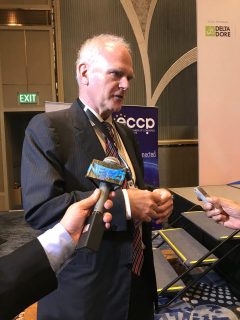
“What we have for Mindanao that we are discussing right now is 55 million euros and a major part will go to Marawi and if things go as we hope, that will be topped up to 100 million in total,” EU Ambassador Franz Jessen said on the sidelines of the Energy Smart Philippines 2017, an EU co-funded conference held at the Shangri-La at the Fort last October 26, 2017.
“Our assistance is in the form of grant money,” the Ambassador said.
However, the EU is the subject of tirades from the Duterte administration.
The President earlier said that it will no longer accept aid from the bloc because it comes with strings attached.
This was later on clarified by Department of Foreign Affairs Secretary Peter Cayetano, who said that the President’s statement only applies to grants that have conditionality.
WATCH the video of Duterte’s statement here.
Reacting to the President Duterte’s rejection of the international aid from the EU, the Ambassador said, “I am not aware if a final decision has been taken.”
He mentioned that there was no official communication received by the EU on the matter.
Also READ here the EU Ambassador’s reaction when asked by Duterte to leave the country.
“If there is a need for clarification, we needed to do that in writing through the DFA,” he added.
Jessen also reassured that “what we have here is an equal partnership, it’s a partnership of friends and the spirit of the different agreements should reflect that.”
Aid agreements, “when we have this, is two-way,” the Ambassador added.
The 55 million euro fund to rehabilitate Marawi will be coordinated with Secretary Jesus Dureza of the Office of the Presidential Adviser on the Peace Process (OPAPP), Mindanao Development Authority, the Department of Finance, Department of Foreign Affairs and the local agencies.
Making Marawi a green city
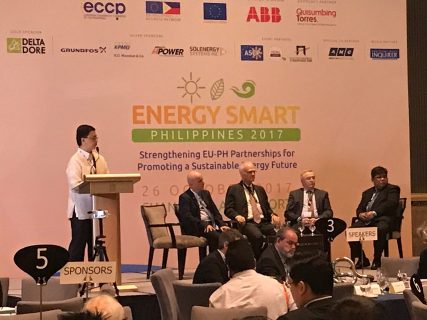
“We are very happy to work hand in hand with the government to create a new green city,” the EU Ambassador said. “The different parts of Mindanao have different needs and different sources of energy,” he added.
“There are many remote communities that need access to energy and one of the ways is to have low-cost sources of energy through clean energy,” the Ambassador emphasized.
The EU Ambassador also mentioned that solar, wind and hydropower investments are typically not provided as direct support but through credit facilities working with some of the European credit agencies and lending institutions as these require larger amounts of money.
Focus on energy and job creation
EU’s focus in Marawi will be on energy and job creation promoting community-based activities.
However, the Ambassador said that EU’s support is on the immediate needs of the war-torn city. “It needs water treatment, making sure that the water is secure and we are also working with the International Red Cross to cover that,” he said.
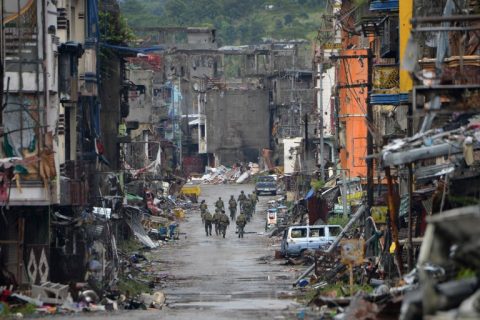
The EU, according to the Ambassador, is in “very early days trying to secure the funds for Marawi” and stressed that the support must promote gender equality and pro-poor activities and “to make sure that the fund is going to the people who have greater needs.”
He cited the EU’s work in Mindanao that includes the demining training conducted in Cotabato, teaching school children to manage unexploded ordnances and how things in conflict-afflicted areas that are lying on the ground can be very dangerous. “We are seeing how to move that training away from Cotabato to Marawi where sadly, has a great need right now,” he said.
Ongoing dialogue
The EU Ambassador announced that the EU has an ongoing constructive dialogue on all political issues including human rights with the government.
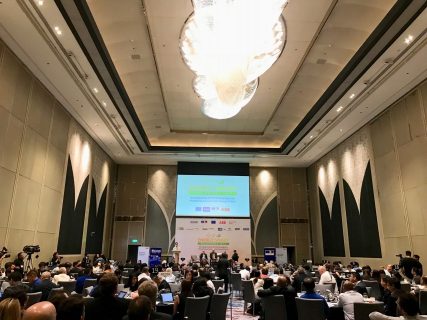
Despite the criticisms hurled by the Duterte Administration to the EU, the Ambassador maintains the view of complementarity between the bloc and the Philippines.
He cited the Philippines’ young and relatively low-cost labor force and advanced access to technology as factors to the good trading relationship between the two countries. “What we no longer produce in Europe is produced here, we have a very good match,” Jessen said.







